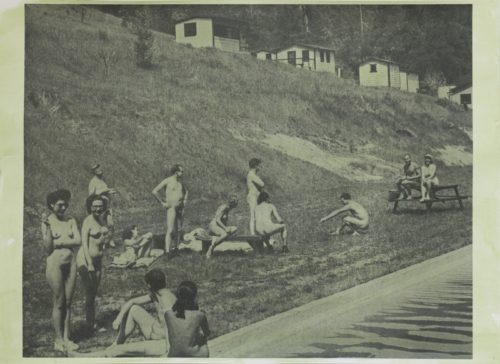
Tadasky
“…Adorno knew it was a question not of protecting ‘culture’ from these horrors but, on the contrary, of recognizing in them the mocking origin of culture itself, finally unveiled in reverse at its end.”
Roberto Calasso
“Charity is meant to be a free gift, a voluntary, unrequited
surrender of resources. Though we laud charity as a Christian
virtue we know that it wounds.”
Mary Douglas
“Sexual activity, whether perverted or not; the behavior of one sex before the other; defecation; urination; death and the cult of cadavers (above all, insofar as it involves the stinking decomposition of bodies): the different taboos; ritual cannibalism; the sacrifice of animal-gods; omophagia; the laughter of exclusion; sobbing (which in general has death as its object); religious ecstasy; the identical attitude toward shit, gods, and cadavers; the terror that so often accompanies involuntary defecation; the custom of making women both brilliant and lubricious with makeup, gems, and gleaming jewels; gambling; heedless expenditure and certain fanciful uses of money, etc. together present a common character in that the object of the activity (excrement, shameful parts, cadavers, etc.) is found each time treated as a foreign body (daz ganz Anderes)…”
Bataille
It increasingly feels as if Western culture is going through a transition. Or perhaps it already has. And perhaps it is a rather deep and significant transition. And I wanted to begin my thoughts on this with Calasso’s short essay on Adorno. And in it he quotes Cesare Vasoli who cautioned against too liberal an access to the works of Nietzsche. Vasoli wrote: “Naturally, I won’t keep Neitzsche on the same shelf as the Einaudi edition of Gramsci.” He added perhaps he would put Nietzsche on a shelf for monstrosities or astrology. Vasoli believed Nietzsche would lead the young astray. Calasso actually wrote a couple short essays on Adorno, or mostly on him. And he is an astute reader of Adorno, as one might expect, since he shares an obsession with the limits and meaning of culture. And of art particularly. He cites Adorno and his description of the ‘animal muteness’ of art.
“It is owing only to their mortal element that works of art participate in reconciliation. But in this they remain slaves of myth. This is their ancient Egyptian character.”
Adorno

Zhang Peili
Today the role of art has shrunk. And maybe *role* is the wrong word. What is certain, however, is that *art* is no longer engaged with in the way it was even fifty years ago. Calasso has a nice essay, another short one, on Robert Walser. And Walser is an author rarely discussed anymore. Not that he was ever discussed all that much. But Walser’s work is of a kind that would be hard to produce today. For the literate audience today has been absorbed by the anti-culture that exists. I’m speaking of the U.S. mostly, but parts of Europe, too. In the 1940s, Hemingway and Faulkner were on the best seller list. Today, hardcover fiction is entirely made of up of *thrillers*. And not good ones. Lee Child and Jeffrey Archer and Danielle Steel, too. So either what was once looked at as pulp writing, or melodrama romance. Now, some of the best writing of the century was pulp, that’s not the issue. It is that the audience, the readers of the NY Times best seller list do not now want anything more. It is work meant to be consumed and forgotten. The Man Booker Prize this year went to Paul Beatty. Now Beatty is a very bourgeois black author with an MFA in creative writing from Brooklyn College. And the book reads like an MFA novel. It is the literary avatar of sorts for the Obama presidency.

1950s Magazine advertisement.
“The self destructive forces at work in bourgeois society can be read from their genesis. Hegel had already perceived in his Phenomenology; total identity simply means death.”
Detlev Claussesn
The end of the bourgeoisie is arriving with a kind of self loathing rage, and a deep resounding sense of panic. Maximillian Forte quotes Fidel Castro in a recent piece… “We are the new Indians…there are people today who want to discover us again, who want to conquer, enslave, and colonize us, and who want to use us like the conquistadores once did….The Indians were sacked for centuries…we are the new Indians and we need defenders. { } We are doing worse than our Indians did during colonial times, because at that time there was no illiteracy. They had their culture. There were no differences. There were no beggars then. There were no beggars. There were no abandoned children. All these inequalities and this tragedy did not exist. These things that the new Indians are enduring did not exist then”.

Gary Kuehn
Calasso’s The 49 Steps is a minor work for him, and yet it is among his most satisfying books, really. For he is asking about the loss of culture, of culture as something that is rewarding. And then, secondly, about what is meant by *interpretation*. Written in 1991 the book feels oddly prescient. Amid the hysteria of the current U.S. presidential election the stripping away of any pretense to culture is generally accepted. This also feels like the last unconscious referendum on *whiteness* by, mostly, white people themselves. The Trump aesthetic in fact cannot be separated from the loss of an audience for literature. The road from Walser or Kafka or Brecht even, to Hemingway and, say, Djuna Barnes, to Paul Beatty and Danielle Steel is the road of cultural evisceration. Of course there *IS* a culture today in the West, but it is one that feels like the endgame for a darkness that began with (in its final stage) with National Socialism. With Heidegger and which culminates in the trivial surveillance state fascism of a Zizek.
Hans Heinz Holz, writing of Max Stirner…
“The ‘destruction of alienation’, that Stirner aims for, { } amounts to ‘the return to authenticity’, and this would be nothing else than the destruction of culture, the return to animality […] the return to the pre-human status.”
Holz is interesting because he was acutely aware of the failures of a society in which education has been degraded. When he writes of the Soviet Union…
“…a great part of the population in Russia was still illiterate and you can’t develop participatory democracy without an educated people. { } …First the educational problems, second the social problems that meant a better provision of medical treatment, the overcoming of unemployment, there was no unemployment in the Soviet Union and I would stress the development of all cultural potentiality of man. I was in the soviet union in the 50’s and 60’s and it was stupendous the the worker in the plants were engaged in cultural activities like the fine arts, sociology and philosophy that they were really engaged in these subjects and all this stuff that we have not in western world. And a great freedom in conditions of doing what they did in the plants, the worker in the soviet union and the socialist countries had much more personal rights than any worker here in the western world.”

Jim Hodges
The U.S. today is an illiterate society. But it is a new illiteracy, in a sense. People have learned to read and write in rudimentary ways, and sometimes in very proficient ways, but they know no way to put these skills to use. Except in basic pragmatic ways. The prevailing belief of the majority of Americans is that prosperity is hierarchical. This is just a given. That the U.S. is great because a very few people have enormous wealth and very high level of luxury and a stress free life (so it is assumed). This is where Trump enters the story. Trump is experienced as proof of American virtue. Not because of anything he says but because he is a visibly successful businessman with celebrity status. And he lives in a kitsch version of Versailles. The gold of his hair is the gold of his furniture and the gold of his wallpaper and his jewelry. His bronzed skin is artificial, purchased, and hence intentionally useless, the sign of not having to work. It is the dialectical opposite of a farmer tan — the redneck tan. Trump’s aesthetic incorporates its opposite(s), he is both man of the people, and the celebrity jillionaire. He is man of the people by not being at all like them. His is the image of a farmer or truck driver as if dipped in gold paint and mounted on a revolving podium in Cesar’s Palace. The Trump aesthetic is not that of an ideal, but rather he is the ‘fable of Trump’.

Cindy Bernhard, photography.
“The connection between money thinking and rational thinking is so deeply ingrained in our practical lives that it seems impossible to question it…”
Norman O. Brown
“All money, properly so called, is an acknowledgement of debt.”
John Ruskin

Hershey chocolate statue of Liberty, Las Vegas.
Ferenczi, says Brown, saw thinking itself as a form of anal eroticism (via the desire to economize). The darkness that haunts modern civilization left traces throughout the 17th and 18th centuries. In Nietzsche, he who leads the young astray. And in Hegel when he speaks of the master/slave equation, or Luther. The best chapter in Life Against Death is the one on *filthy lucre*. The emptiness of the desire for gain, as it separated from hoarding, is like a shadow that tracks modern humanity. The earliest markets were sacred, and money was exchanged in temples. Even if Brown is only partly right, the fact is that non-rational factors inform all financial activity. The distant echo of sacrificial animals, the bleating goat that was associated with tragic theatre, all touch on the anal eroticism of contemporary economics. Money is not an infantile wish, said Freud. Hence it is unsatisfying. Luxury is waste. It is an expression of futility said Veblen. There is an impulse in the collective neurosis that looks to produce that which can be then wasted. And following upon this is a guilt that is associated with debt. Capitalism is then the most neurotic form of social organization. Marx said gold and silver were “social expressions of superfluity”. The fable of Trump is a good deal deeper than the story of Hillary. Brown, of course, saw money as inseparable from excrement. And feces is death. In that sense, the Trump figure, the image, the human statue come to life is a rendering of loss, of the unclean. Trump is the quintessential man-with-fuck-you-money. And his constant bankruptcies are only reinforcing him as a figure of luxurious waste.
Bataille saw the Pyramids are symbols of wanton excess. The scarab is a dung beetle. Nigel Dodd writes of Walter Benjamin’s vision of Capitalism’s guilt history as the endless piling up of compound debt. The Clinton’s are loan sharks, while Trump is money itself.

Quentin Massys (Tax Collectors, early 16th century, Flemish).
“As Simmel explained, a feudal lord could demand specifically a quantity of honey and poultry from his serfs and thereby directly determine their labour. ‘But the moment he imposes merely a money levy the peasant is free, insofar as he can decide whether to keep bees or cattle or anything else’ (Simmel 1978 1907). With money, decisions can be deferred, revised, reactivated, cancelled; it is ‘frozen desire’ (Buchan 1997). But, ‘all of these consequences are dependent on what is, in principle, the most important fact of all, the possibility of monetary calculation’ (Weber). This third attribute of money, as a measure of value (money of account), enables the calculation of actual and potential costs and benefits, profits and losses, debts, prices. In short, money is the basis for the progressive rationalization of social life – a process that began, as we shall see, in those empires of ancient Mesopotamia.”
Geoffrey Ingham
But money also takes on, always, a quality of appropriation. It must take something to continue its existence. Which is why it always feels so religious and ritualistic. And it this association with hierarchy in Western churches and institutional religion that makes it easy to see how money itself establishes, as a god given law, the social value of individuals.

Carsten Nicolai
“In all Indo-European languages, words for ‘debt’ are synonymous with those for ‘sin’ or ‘guilt’, illustrating the links between religion, payment and the mediation of the sacred and profane realms by ‘money’. For example, there is a connection between money (German Geld), indemnity or sacrifice (Old English Geild), tax (Gothic Gild) and, of course, guilt.”
Geoffrey Ingham
Debt is a dynamic that forms inequality even if money is not involved. And this is the part where Benjamin emphasized the passing of time. For the allegory of debt is one linked to ancestors and memory. The development of number and alphabet are inextricably intwined with recording debt and with how to remember it. Mesopotamia and ancient Egypt both used ledgers and employed book keeping of some sort. One’s worth was tied into calculation. All of this is found in Adam Smith, in fact. But one of the interesting side bar discussions of the history of money is the effect of coinage on ritual memory. In other words the coin can be hidden or moved. The intrigues of the aristocracy are the properties of hierarchy and calculation, of abstraction.
“A chief must give potlatches for himself, his son, his son-in-law, or his daughter,
and for his dead. He can only preserve his authority over his
tribe and village, and even over his family, he can only maintain
his rank among the chiefs—both nationally and
internationally—if he can prove he is haunted and favoured both
by the spirits and by good fortune, that he is possessed, and
also possesses it. And he can only prove this good fortune by
spending it and sharing it out, humiliating others by placing
them ‘in the shadow of his name’.”
Marcel Mauss

Showgirls, Dunes Hotel, Las Vegas, 1955.
This is the origin of saving face, and of all inherited rituals. In fact, it is the origin of the infection of inheritance. And the relationship of burden and guilt with rivalry and with, perhaps most importantly, the performance of possession. Of power. I always think of Rosellini’s film The Rise of the Louis XIV when thinking on the role of wealth. In the U.S. today the adoration of wealth cuts across a majority of the culture. And the election of Trump is both another example, but also an unconscious repudiation of it. For the specter of those who elected Trump soon turning on him must be obvious. And when they turn, those who blindly believed, they will tear him apart in a sacrificial rage. For the collapse of meaning is the bedrock issue and when Kristeva writes of abjection…
“The abject is not an ob-ject facing me, which I name or imagine. Nor is it an ob-jest, an otherness ceaselessly fleeing in a systematic quest of desire. What is abject is not my correlative, which, providing me with someone or something else as support, would allow me to be more or less detached and autonomous. The abject has only one quality of the object—that of being opposed to I. If the object, however, through its opposition, settles me within the fragile texture of a desire for meaning, which, as a matter of fact, makes me ceaselessly and infinitely homologous to it, what is abject, on the contrary, the jettisoned object, is radically excluded and draws me toward the place_where meaning collapses.”
…she is touching on something significant, I think, in what is being distilled down in contemporary culture. The desire for sacrifice is linked to a post literate dysfunctional populace that senses only that they are forever in the ‘shadow of his name’. Everyone or anyone’s name. Veblen said waste was a cultural symbol. The vast amounts of money and property owned by an elite minority of people, the often quoted one percent, is not just superfluous but it is an increasingly violent superfluity. For when there is so much to lose, the desperation to display, and to perform your wealth becomes a form of nihilism — the money exists only on screens. There is no adequate presentation of this level of wealth anymore. The financialization of capital, among other things, has led to the ability to hyper accumulate and hoard. The new cultural or narrative trope of *hackers* as a quintessential threat to civilization (read Russia hacked the DNC, or countless Hollywood films) is a piece in the general collapse of meaning. The hacker is alone at a keyboard. The violence is abstract. The surveillance state links into this, too. The hacker is everyman. With a few keystrokes the virtuosity of the anonymous destroyer of worlds is evidence of untapped potential. This was the engine behind Mr. Robot, which for all its flaws, still was intuitively expressing something that much of the white bourgeoisie sensed. The affluent strata is crumbling in a kind of inarticulate grief over how somehow the status quo was not winning this time, the working poor, the barely sustainable week to week strata were secretly elated. The culture was now, in the person of Hillary Clinton, openly embracing a kind of white shamanistic magical thinking. The educated audience that once read Faulkner enough to make him a best seller was now looking to Spirit cooking and pants suits flash mobs. This is not to suggest a quick read of Light in August would change anything. This is about debt and guilt and amnesia. And as David Harvey notes, overaccumulation is the most pressing aspect of the crises of Capitalism today.

Tereza Zelenkova and Joanna Piotrowska, photography.
The problem has deeper roots though. Capitalism itself is predicated on the actions of debt. And debt is something difficult to forget. That this culture so easily forgets everything only suggests that it can never forget enough. Norman O. Brown imagined that money, the neurosis of money was structurally mirroring the unconscious. This is not all that far away from Lacan, really. If language itself has an anal character.
“Gold is not a color, colors are natural.”
Spengler
The two most indebted countries of the modern era, the U.S. and England, are the two most financially successful. Or were. I think that’s not really the point, though. Bataille saw excess as a basic, or the basic problem in Capitalism. He saw it, of course, in terms outside bourgeois economics. He saw the production of too much as fundamental to the ‘general economy’. And war was a great way to use up the excess. And this made the link between death and money quite clear and intimate. Bataille often seems to be describing Donald Trump in fact. What he describes as the ‘augmented splendor of a sinister industrialist and his even more sinister old wife’. But Bataille imagined the bourgeoisie hiding their expenditures from other classes. This is no longer the case. For societies of the West today, the expenditure is a performance. But it is increasingly a performance of decay. I remember the photo essay on Rush Limbaugh and his house, or penthouse, and his decor was one of cherubs and ornate filigree. His main guest suite was an exact replica of the Presidental suite of the Hotel George V in Paris. Limbaugh lived alone with his cat (and percocets I guess). Leather bound, and unopened books lined the cherrywood shelves. It was a bit like Jeffrey Epstein’s penthouse in NYC, too, and what Peter York dubbed *dictator style*. But this is not just gossip, it is the precursor to Trump as President. (worth noting that Epstein was sued by Maximilia Cordero, allegedly a transexual, who described his penthouse thus…“That defendant gave plaintiff a tour of his mansion, showing her a huge crystal staircase with a huge crystal ball by the railing, ceiling chandeliers, a lounge room with red chairs, a statute [sic] of a dog with a statute [sic] of dog feces next to it.” Spelling and grammar aside, it’s perhaps not possible to give a better picture of the inherent death obsessions of the filthy rich. The cultural implications of mass entertainment, of the endless screen images recycled over and over, for the purposes of corporate attention harvesting must be vast. As Jonathan Crary wrote…“Most images are produced and circulated in the service of maximizing the amount of time spent in habitual forms of individual self management and self regulation.” And it was Jameson who noted that mid century modernism provided culture as a primary means of evading the prohibitions of the super-ego. Today, the electronic attention apparatus serves as collective super-ego.

Bertrand Lavier
There are no longer the traditional delineations of private and public, or personal and collective. The manufacturing of images designed to grab *eyeballs* is only harvesting a pseudo attention, and this has far reaching psychological implications. The society of control is merging police and military surveillance with mega marketing entities. But also, this hegemonic pseudo attention is being normalized AS attention. There is no space left for contemplation of image, not even privately. Or rather, if private contemplation exists, it exists in a kind of weird sealed off world of psychic isolation. The lone contemplative is self positioning defensively.
Still, the last twenty years of mass internet usage doesn’t preclude sacrificial logic, or the drama of Oedipal tensions. In fact, I am starting to think the mass information age has actually intensified the psychic mechanisms of scapegoating and guilt. The hyper narcissism of western societies is what seems to be unravelling in the public discourse of this presidential election. And this is where I started; the shift in culture. One form of culture has reached a kind of singularity — a post commodity form of post humanness (as Beller puts it, I think) while the front edges of (per Bernard Stiegler) of counter products are starting to coalesce. The role of art seems to have refocused itself (and this is Crary’s point) against the continuous shaping and restructuring of attention. Art is now, if it is to have meaning, something which destabilizes the coercive merging of listening and looking. The listening and looking which itself is delimited. That destabilizing is, however, both illusive and possibly contradictory.
Strategies, artistically, is a vast topic. And in a sense, it was why I started writing this blog. I had, over time, become increasingly unnerved (if that’s the word) when doing theatre, not just because of shrinking audience, but also because of the quality of audience. Or, rather, the quality of attention brought to the theatre. Often the audience was full of people I had seen in other audiences, over twenty years, but who were now, if one spoke with them, approaching their attendance at the theatre in a different way. This is just anecdotal, and subjective, but the sense one had was of being defended in some way. Submission withheld. The singular aspect of engagement was missing. It didn’t feel intentional, or hostile, it was just that a ritual respect was gone. It was not gone in them as much as socially gone — and I have this feeling in all artistic sites, now. Of course such anecdotal observations betray the one making them. Still, there is a collective anxiety that prevents something, even if it was always mysterious, from happening. Less and less is there a sense of the unique and immanent.

Coins, Zhou Dynasty, 350 BC.
Against this are the layered the eroded language abilities of most adults, the loss of literacy, the aphasic tendencies of (especially) the young, and the increasing use of chemical numbing. The widespread use of psychoactive drugs is now part of what (per Crary) synchronizes consciousnesses. One part of the backdrop to this is, I think, the allegory of trace memories and trauma, the anal sadistic gesture, the imaginary suicidal sense of sexual conquest. The Clinton dynasty is, in a sense, the third or fourth generation dupe of Mussolini, himself a dupe of various medieval inquisitors. The Clintons were dying before our eyes. Going mad before our eyes, and perhaps Bill even more than Hillary. The rheumy eyed old Vatican torturer or the infirm boatmen on the Styx. While Trump was the filth itself. Somewhere in the addled public brain the sense of filthy lucre being better than a trip to Hades must have registered.
And, again, there this is whiteness itself. The last spasmodic clutch for privilege is now just the reflex contraction of a corpse. Hillary could never muster enthusiasm. Her energy was barely that of crustacean life itself. Partly this was another version of the sunlamp tan. Only the worker must force him or herself to work, while the overseers sit in the shade. They watch, they surveil. The gaze of CCTV is the new reptile vision, or insect eye. The metaphor of reptile vision is rather telling in fact (including the parietal eye on the top of the head of some reptiles which serves to regulate circadian rhythmicity. And then there is the famous photo of Queen Elizabeth with the pupil in her left eye in the shape of slit — sort of echoing Princess Diana’s claim the Royal Family were reptile hybrids…but I digress…). The gaze of the mechanical eye is now internalized as a part of Nature.

Richard Ross, photography. (Confessional, Mission Santa Barbara, CA.)
Corporations such as Google and Apple, Verizon, or Telstra in Australia and Orange in France, are all essentially doing the opposite of whatever it is they say they are doing. The public is mined for data. And that data is then digested and put to use in further human data mining — refining and refining the colonizing of consciousness. The idea of enjoyment, today, is the most pernicious one in existence, I think. And so far has this word been disfigured that the entirety of the collapse of meaning might well be pinned to it.
Adorno wrote, in 1951, in Minima Moralia:
“Thus impoverishment of the relation to others sets in: the capacity for seeing them as such and such and not as functions of one’s own will withers, as does that, above all, of fruitful contrast, the possibility of going beyond oneself by assimilating the contradictory. These are replaced by an appraising knowledge of people for which the best are in the end the lesser evil, and the worst not the greatest. This way of reacting, however, the pattern of all administration and ‘personnel policy’, tends of its own accord, and in advance of any education of the political will or commitment to exclusive programmes, towards Fascism.”
Adorno adds later in that paragraph that the gaze of the manager tends to break up the job candidate’s face, those looking for work, say, into utilisable parts. And he adds, this is akin to the medical examination to determine capacity for work (servitude), or liquidation. The audience for culture today is looking and listening in some fashion that is intertwined with that administrative gaze. They watch the stage as a CCTV camera watches them. The gaze of lizards. We sink back into some new Palezoic era, breathing radioactive chalk dust and scratching for grubs. Or, into a new Proterozoic Age … also known as the Age of Bacteria.

The illusion of stature, that human size is a magnitude above and beyond the microbe. DNA the little great leveler. The rest is package and prosthetic sort of.
Toxoplasmosis appears to increase the incidence of rage in its victims. Some STD’s appear to increase libido in some sufferers.
Who’s driving what is after all a machine really. Maybe we never really left the Age of Bacteria.
reptilian